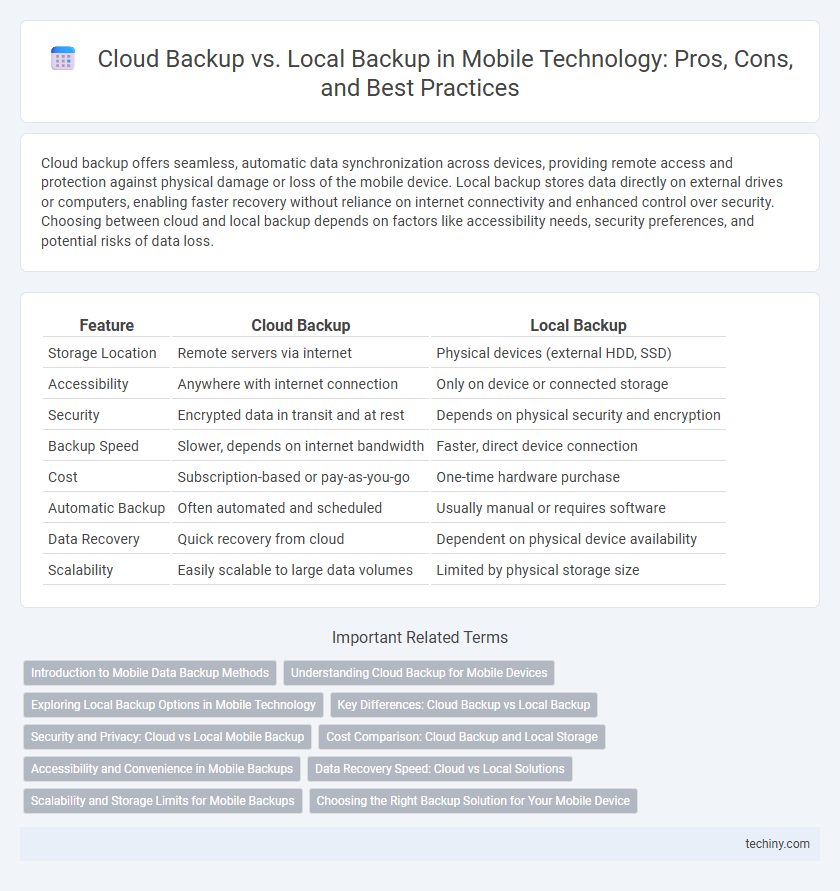Cloud backup offers seamless, automatic data synchronization across devices, providing remote access and protection against physical damage or loss of the mobile device. Local backup stores data directly on external drives or computers, enabling faster recovery without reliance on internet connectivity and enhanced control over security. Choosing between cloud and local backup depends on factors like accessibility needs, security preferences, and potential risks of data loss.
Table of Comparison
| Feature | Cloud Backup | Local Backup |
|---|---|---|
| Storage Location | Remote servers via internet | Physical devices (external HDD, SSD) |
| Accessibility | Anywhere with internet connection | Only on device or connected storage |
| Security | Encrypted data in transit and at rest | Depends on physical security and encryption |
| Backup Speed | Slower, depends on internet bandwidth | Faster, direct device connection |
| Cost | Subscription-based or pay-as-you-go | One-time hardware purchase |
| Automatic Backup | Often automated and scheduled | Usually manual or requires software |
| Data Recovery | Quick recovery from cloud | Dependent on physical device availability |
| Scalability | Easily scalable to large data volumes | Limited by physical storage size |
Introduction to Mobile Data Backup Methods
Mobile data backup methods primarily include cloud backup and local backup, each offering distinct advantages for mobile technology users. Cloud backup securely stores data on remote servers accessible via the internet, providing seamless synchronization and automatic updates across devices. Local backup involves saving data on physical storage like external drives or SD cards, ensuring faster recovery times and offline accessibility without relying on network connectivity.
Understanding Cloud Backup for Mobile Devices
Cloud backup for mobile devices offers seamless data protection by automatically saving photos, contacts, and app data to remote servers, ensuring accessibility from any internet-connected device. This method minimizes the risk of data loss due to device damage, theft, or loss while providing scalable storage options without physical hardware limitations. Cloud backup services like Google Drive, iCloud, and OneDrive integrate with mobile OS, enabling real-time synchronization and easy recovery.
Exploring Local Backup Options in Mobile Technology
Local backup options in mobile technology typically involve storing data directly on devices such as external hard drives, SD cards, or computer systems using USB connections. These methods offer enhanced data security by keeping information physically controlled and accessible without internet dependency. Leveraging local backups ensures faster recovery times and reduces vulnerability to cyber threats compared to cloud-based alternatives.
Key Differences: Cloud Backup vs Local Backup
Cloud backup offers remote data storage with automatic synchronization across multiple devices, ensuring real-time access and disaster recovery, while local backup relies on physical devices like external hard drives, providing faster data recovery speeds but limited by hardware availability and vulnerability to physical damage. Cloud solutions typically include scalable storage capacity and encryption protocols for enhanced security, whereas local backups require manual updates and local security measures. Data retrieval from cloud backups depends on internet connectivity, contrasting with local backups that allow offline access.
Security and Privacy: Cloud vs Local Mobile Backup
Cloud backup offers robust encryption protocols and remote data redundancy, enhancing security against physical theft or device loss. Local backup provides greater control over privacy by storing data directly on personal hardware, minimizing risks of unauthorized access or third-party breaches. Choosing between cloud and local backup depends on balancing convenience and the desired level of data sovereignty in mobile technology security.
Cost Comparison: Cloud Backup and Local Storage
Cloud backup typically involves recurring subscription fees based on storage capacity and data transfer rates, offering scalable costs ideal for businesses with fluctuating storage needs. Local storage requires upfront investment in hardware such as external drives or NAS devices, which may incur maintenance and replacement costs over time but lacks ongoing monthly fees. Evaluating total cost of ownership reveals cloud solutions provide flexibility and offsite security advantages, while local backups offer predictable one-time expenses and faster data recovery speeds.
Accessibility and Convenience in Mobile Backups
Cloud backup offers superior accessibility and convenience for mobile users by enabling automatic data synchronization across multiple devices without physical connection requirements. Local backup requires manual intervention and physical storage media, limiting data access when away from the specific device or backup location. Mobile technology trends heavily favor cloud solutions due to seamless integration with apps, real-time updates, and remote file retrieval capabilities.
Data Recovery Speed: Cloud vs Local Solutions
Local backup solutions offer significantly faster data recovery speeds due to direct access to physical storage devices, minimizing latency compared to cloud backups. Cloud backup depends on internet bandwidth and server response times, which can introduce delays during critical recovery operations. Enterprises prioritize local backups for rapid disaster recovery, while cloud solutions balance accessibility and scalability with moderate recovery speed.
Scalability and Storage Limits for Mobile Backups
Cloud backup for mobile devices offers unparalleled scalability, allowing users to effortlessly increase storage capacity as their data grows without hardware constraints. In contrast, local backups are limited by the physical storage capacity of the device or external media, often requiring manual upgrades or additional hardware purchases. Cloud services also provide flexible storage plans and seamless data management, making them ideal for users needing scalable, high-volume mobile backup solutions.
Choosing the Right Backup Solution for Your Mobile Device
Selecting the ideal backup solution for your mobile device hinges on balancing accessibility and security. Cloud backup offers seamless synchronization across multiple devices with automatic updates, while local backup provides greater control and faster recovery without internet dependence. Prioritize features like encryption, storage capacity, and ease of restoration to align with your data protection needs.
Cloud Backup vs Local Backup Infographic

 techiny.com
techiny.com